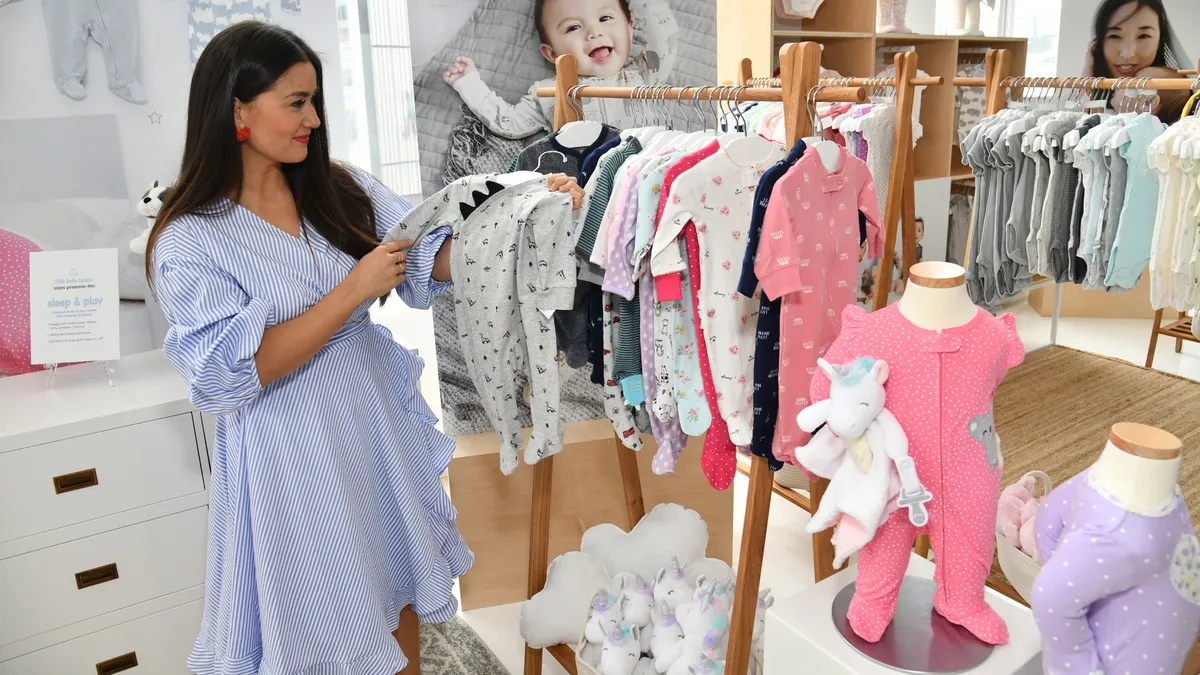Dive Brief:
-
Carter's on Friday said it will close 25% of its fleet or about 200 stores as leases expire, with nearly 60% of that possibly complete by the end of next year and 80% by the end of 2022, CEO Michael Casey told analysts, per a Seeking Alpha transcript.
-
E-commerce, which was profitable, helped offset sales declines in stores due to the pandemic, as did sales through partner retailers including Walmart, Target, Costco, Amazon, Kohl's and Macy's, executives said.
-
Third quarter net sales fell 8.3% to $865 million as operating income rose 35.4% to $113.5 million, and net income rose 34.8% (or $21 million) to $81.2 million, according to a company press release. U.S. comps fell 3.5%, as e-commerce rose 17.2%.
Dive Insight:
U.S. shopping centers, already overwhelmed with traffic declines that have worsened with the COVID-19 pandemic, continue to hear from tenants that won't renew their leases.
This time it's Carter's, which runs its namesake brand and OshKosh B'gosh, along with a slew of others including private labels for several partner retailers. The planned closures "are generally older, lower margin stores in declining centers and less likely to support our focus on high-value omnichannel customers," Casey said.
The company does plan to open some stores, too. Some locations served a purpose even when they were closed due to the pandemic. The retailer began offering curbside pickup for the first time, and boosted its store-based fulfillment as e-commerce grew in the period. Already 85% of its U.S. stores are in open-air centers, which Casey noted is an advantage against its mall-based competition.
"Open air centers provide a better, more convenient experience for same-day pickup and curbside pickup of online purchases," Casey told analysts. "We plan to continue opening stores located in more densely populated areas and plan to close stores in more remote and declining centers. We currently plan to open less than 100 co-branded stores over the next five years."
In that process the company will take advantage not only of expiring leases but in some cases also the "kickout provision," a reference to a common mall lease clause that allows retailers to alter their agreements when anchors or other retailers exit. And other retailers are indeed exiting: Carter's plans come on the heels of Gap Inc.'s announcement that it would close some 350 stores, almost all in enclosed malls.
Despite the challenges from the pandemic, the company beat expectations in the third quarter, on the strength of both its e-commerce and wholesale partnerships. Its grip on inventory helped it avoid too many markdowns or lower-margin sales through off-price retailers, executives said.
As a children's apparel retailer, the company enjoys a rare stability in an otherwise beleaguered sector, which translated to fairly robust sales during the back-to-school season and expected strength at the holidays. "Children's apparel is a less discretionary purchase," Casey said. "We focus on essential core products bought in multiple quantities on a frequent basis in those early years of a child's life."
But there may also be a headwind unique to that segment as well: a "potentially falling US birth rate," according to UBS analysts, which found the 2019 birth rate already down about 1% year over year. "The risk is COVID-19 and its ripple effects on the economy cause a deceleration," UBS analyst Jay Sole wrote in a Monday note. "We think this could be due to people choosing to have babies in places where they perceive less COVID-19 risk."
















